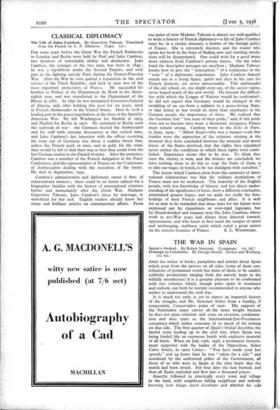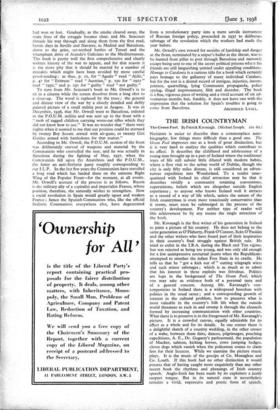THE WAR IN SPAIN
AMID the welter of books, pamphlets and articles about Spain which pour from the presses on all sides (some of them con- tributions of permanent worth but more of them, to be candid, rubbishy productions ranging from the naively inept to the wilfully mendacious) it is a genuine pleasure to be confronted with two volumes which, though poles apart in treatment and outlook, can both be warmly recommended to anyone who wishes to understand the civil war.
It is much too early as yet to expect an impartial history of the struggle, and Mr. Sencourt writes from a frankly, if temperately, Conservative point of view. His support of the Nationalist cause carries all the more weight because he does not spare criticism and even, on occasion, condemna- tion and does spare us the International-Jew-Freemason conspiracy which makes nonsense. of so much of the writing on that side. The first quarter of Spain's Ordeal describes the fateful years leading up to the civil war, when Spain was being loaded like an enormous bomb with explosive material of all kinds. When on July 13th, 1936, a prominent Govern- ment supporter told the leader of the Opposition, Senor Caivo Sotelo, in open Cortes : " You have made your last speech," and 24 hours later he was " taken for a ride " and murdered by the uniformed police of the Government, all those of us who were in Spain at the time knew that the match had been struck. For four days the fuse burned, and then all Spain exploded and flew into a thousand pieces.
Anarchy followed in practically every town and village in the land, with neighbour, killing neighbour and nobody knowing how things stood elsewhere • and whether his side had won or lost. Gradually, as the smoke cleared away, the main lines of the struggle became clear, and Mr. Sencourt threads his way through and along them from the first mad, heroic days in Seville and Navarre, -in Madrid and Barcelona, down to the grim, set-teethed battles of Teruel and the triumphant drive of Aranda's Galicians to the Mediterranean. The book is pretty well the first comprehensive and clearly written history of the war to appear, and for that reason it is the more pity that it should be marred by a number of mistakes which might have been avoided by more careful proof-reading : as thus, p. 12, for " Agadir " read " Ajdir," P. 47 for " Eritrean " read " Austrian," p. IQO for " 1922 " read " 1932," and p. 291 for " guilty " read " not guilty."
To turn from Mr. Sencourt's book to Mr. Orwell's is to sit in a cinema while the screen dissolves from a long shot to a close-up. The wood is replaced by the trees ; the general and distant view of the war by a closely detailed and deftly painted picture of a small militia post in Aragon. It was in December, 1936, that Mr. Orwell went to Barcelona, enlisted in the P.O.U.M. militia and was sent up to the front with a " mob of ragged children carrying worn-out rifles which they did not know how to use." It was no wonder that " there were nights when it seemed to me that our position could be stormed by twenty Boy Scouts armed with air-guns, or twenty Girl Guides armed with battledores for that matter."
According to Mr. Orwell, the P.O.U.M. section of the front was deliberately starved of weapons and material by the Communists who controlled the rear, and he was actually in Barcelona during the fighting of May, 1937, when the Communists fell upon the Anarchists and the P.O.U.M., the latter an anti-Stalinist party roughly corresponding to our I.L.P. In the last few years the Communists have travelled a long road which has landed them on the extreme Right Wing of the Popular Front—for the moment, at all events. Mr. Orwell's account of the process is as follows. Russia is the military ally of a capitalist and imperialist France, whose position, therefore, she naturally wishes to strengthen. Now a social revolution in Spain would greatly upset and weaken France ; hence the Spanish Communists who, like the official Stalinist Communists everywhere else, have degenerated from a revolutionary party into a mere servile instrument of Russian foreigrt policy, proceeded in 1937 to deliberate sabotage of the revolution which the workers had made the year before.
Mr. Orwell's own reward for months of hardship and danger at the front, terminated by a sniper's bullet in the throat, was to be hunted from pillar to post through Barcelona and narrowly escape being sent to one of the secret political prisons where his friends are still languishing untried under appalling conditions. Homage to Catalonia is a curious title for a book which certainly pays homage to the gallantry of many individual Catalans, but for the rest is a dismal record of intrigue, injustice, incom- petence, quarrelling, lying Communist propaganda, police spying, illegal imprisonment, filth and disorder. The book is a fine, vigorous piece of writing and a vivid account of six ad- venturous months but, frankly, it does not leave one with the impression that the solution for Spain's troubles is going to



















































 Previous page
Previous page